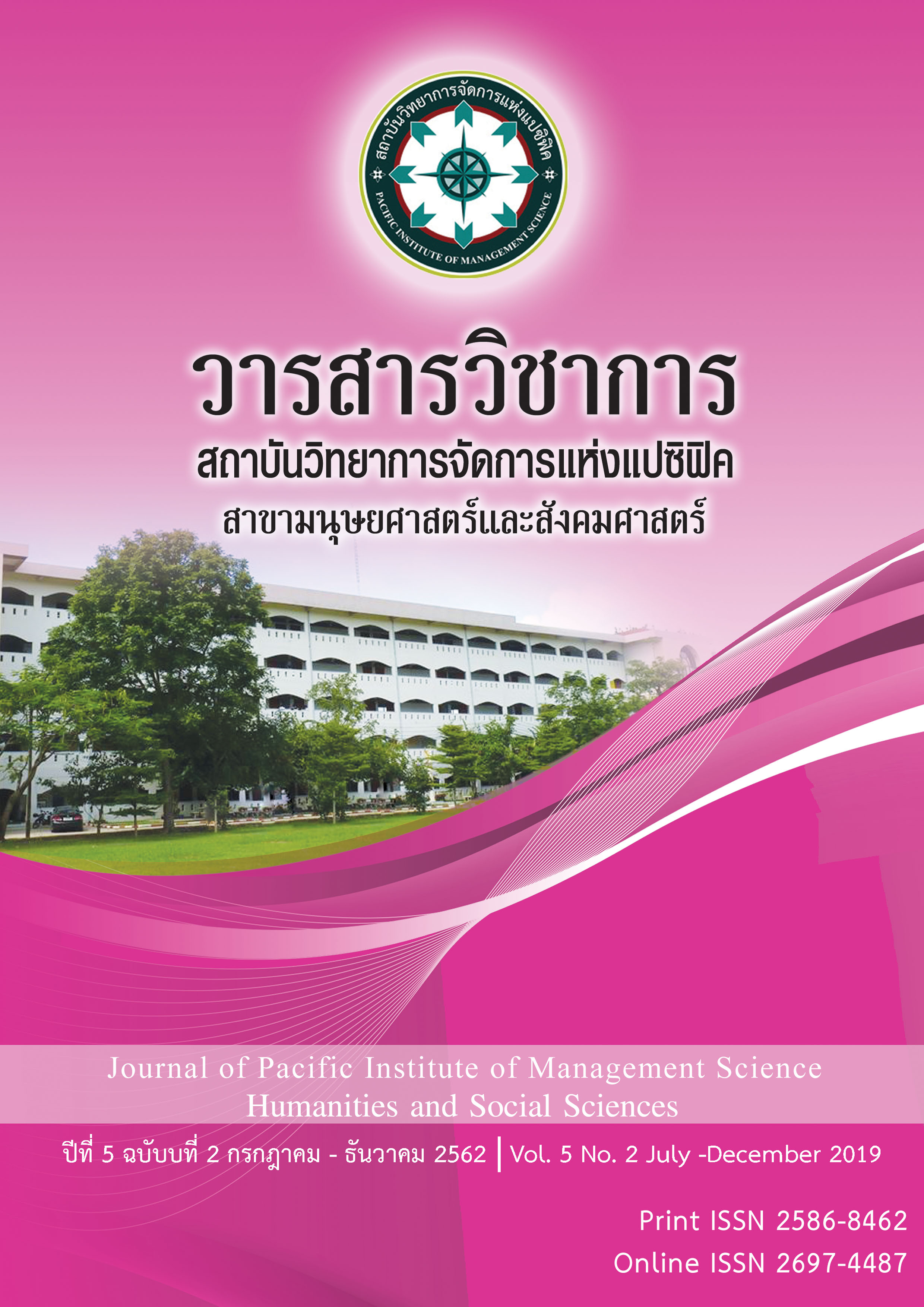การจัดองค์กรแห่งการเรียนรู้ของธุรกิจค้าปลีกสมัยใหม่ ในจังหวัดนนทบุรี
คำสำคัญ:
การจัดองค์กร, การเรียนรู้, ธุรกิจค้าปลีก, นนทบุรีบทคัดย่อ
การวิจัยมีวัตถุประสงค์เพื่อศึกษา 1) เพื่อศึกษาองค์ประกอบของการจัดองค์กรแห่งการเรียนรู้ของธุรกิจค้าปลีกสมัยใหม่ 2) เพื่อศึกษาการเป็นองค์กรแห่งการเรียนรู้ของธุรกิจค้าปลีกสมัยใหม่ 3) เพื่อศึกษาประสิทธิผลของการจัดองค์การแห่งการเรียนรู้ของธุรกิจค้าปลีกสมัยใหม่ 4) เพื่อศึกษาหาความสัมพันธ์ระหว่างการจัดองค์กรแห่งการเรียนรู้ของธุรกิจค้าปลีกสมัยใหม่กับการเป็นองค์กรแห่งการเรียนรู้ของธุรกิจค้าปลีกสมัยใหม่ 5) เพื่อศึกษาหาความสัมพันธ์ระหว่างการเป็นองค์กรแห่งการเรียนรู้ของธุรกิจค้าปลีกสมัยใหม่ กับประสิทธิผลของการจัดองค์การแห่งการเรียนรู้ของธุรกิจค้าปลีกสมัยใหม่ 6) เพื่อศึกษาหาความสัมพันธ์การเป็นองค์กรแห่งการเรียนรู้ของธุรกิจค้าปลีกสมัยใหม่กับประสิทธิผลของการจัดองค์การแห่งการเรียนรู้ของธุรกิจค้าปลีกสมัยใหม่ โดยใช้กรอบแนวคิดและทฤษฏีการจัดการความรู้ เครื่องมือที่ใช้เก็บข้อมูลได้แก่ การวิจัยเชิงปริมาณ คือ พนักงานที่ทำงานในห้างสรรพสินค้า เฉพาะจังหวัดนนทบุรี จำนวน 400 คน วิเคราะห์ข้อมูลด้วยโปรแกรมคอมพิวเตอร์สำเร็จรูป สรุปผลวิจัยดังนี้
วัตถุประสงค์ที่ 1 เพื่อศึกษาองค์ประกอบของการจัดองค์กรแห่งการเรียนรู้ของธุรกิจค้าปลีกสมัยใหม่ในภาพรวมมีระดับความคิดเห็นมาก เมื่อพิจารณาเป็นรายด้าน พบว่า ด้านภาวะผู้นำมีระดับความคิดเห็นมาก
วัตถุประสงค์ที่ 2 เพื่อศึกษาการเป็นองค์กรแห่งการเรียนรู้ของธุรกิจค้าปลีกสมัยใหม่ในภาพรวมมีระดับความคิดเห็นมาก เมื่อพิจารณาเป็นรายด้าน พบว่า ด้านการเอื้ออำนาจมีระดับความคิดเห็นมาก
วัตถุประสงค์ที่ 3 เพื่อศึกษาประสิทธิผลของการจัดองค์การแห่งการเรียนรู้ของธุรกิจค้าปลีกสมัยใหม่ ในภาพรวมมีระดับความคิดเห็นมาก เมื่อพิจารณาเป็นรายด้าน พบว่า ด้านความพึงพอใจมีระดับความคิดเห็นมาก
วัตถุประสงค์ที่ 4 เพื่อศึกษาหาความสัมพันธ์ระหว่างการจัดองค์กรแห่งการเรียนรู้ของธุรกิจค้าปลีกในภาพรวม พบว่า มีความสัมพันธ์ อย่างมีนัยสำคัญทางสถิติที่ 0.01
วัตถุประสงค์ที่ 5 เพื่อศึกษาหาความสัมพันธ์ระหว่างการเป็นองค์กรแห่งการเรียนรู้ของธุรกิจค้าปลีกสมัยใหม่ กับประสิทธิผลของการจัดองค์การแห่งการเรียนรู้ของธุรกิจค้าปลีกสมัยใหม่ในภาพรวม พบว่า มีความสัมพันธ์ อย่างมีนัยสำคัญทางสถิติที่ 0.01
วัตถุประสงค์ที่ 6 เพื่อศึกษาหาความสัมพันธ์การเป็นองค์กรแห่งการเรียนรู้ของธุรกิจค้าปลีกสมัยใหม่กับประสิทธิผลของการจัดองค์การแห่งการเรียนรู้ของธุรกิจค้าปลีกสมัยใหม่ในภาพรวม พบว่า มีความสัมพันธ์ อย่างมีนัยสำคัญทางสถิติที่ 0.01
เอกสารอ้างอิง
บูรชัย ศิริมหาสาคร. (2550). การจัดการความรู้สู่ความเป็นเลิศ. กรุงเทพมหานคร: แสงดาว.
สุภมาส อังศุโชติ และคณะ. (2551). สถิติวิเคราะห์สำหรับการวิจัยทางสังคมศาสตร์และพฤติกรรมศาสตร์: เทคนิคการใช้โปรแกรม LISREl. เจริญดีมั่งคงการพิมพ์. กรุงเทพมหานคร.
อดิศร ไชยคุปต์. (2554). ได้กำหนดยุทธศาสตร์ไว้หลายด้านและในยุทธศาสตร์ด้านที่ 4. เข้าถึง www.oja.go.th/humun/education/data/gynabadnubk.doc. เดือนเมษายน.
Beesley, L.G.A., & Cooper, C. (2008). Defining knowledge management (KM) activities: Towards consensus. Journal of Knowledge Management.
Cronbach, Lee Joseph. (1970). Essentials of Psychological Testing. New York: Harper and Row.
Chennamaneni, A. (2006). Determinants of knowledge sharing behaviors: Developing and testing an integrated theoretical model. (Doctoral dissertation). Arlington: The University of Texas.
Chaplin, J.P. (1968). Dictionary of Psychology. New York: Peaguin book.
Dalkir, K. (2005). Knowledge management in theory and practice.USA: Elsevier Butterworth Heinemann.
Hsy, I.C., and Want, Y.S. (2008). A model of intraorganizationl knowledge sharing: Development and initiak test.
Journal of Globak Information Management.
Hoy W.K. and Miskek, C.G. (2008). Educational Administration: Theory, Research and Practice. New York: McGraw-Hill, Inc.
Hendriks, P. (1999). Why share knoeledge? The influence of ICT on the motivation for knowledge sharing.
Knowledge and Process Management.
Ichijo, K., and Nonaka, I. (2007). Knowledge creation and management: New challenges for managers. New
York:Oxferd university Press.
Jasimuddin, S.M. (2008). A holistic view of knowledge management strategy.Journal of Knowledge management.
Keyes, J. (2008). Identifying the barriers to knowledge sharing in knowledge intensive organizations (Doctoral dissertation). Prescott Valley, Arizona: North central University.
Lovelock C. and Wrigth L. (2007). Principles of service marketing and management. 2 th ed. Upper Saddle River,
NJ: Prentice Hall.
Lawrence, D.J. (1998). Organizational Behavior. 2nd ed. New Jersey: Prentice-Hall, Inc.
Leiponen, A. (2006). Dynamic competences and firm performance (Interim report) Laxenburg, Austria, Intemational Institute for Applied Systems Analysis (IIASA): 1-22.
Lai, M.F. and Lee, G.G. (2007). Risk avoiding cultures toward achievement of knowledge sharing. Business
Process Management jourmal.
Lunenburg, Fred C. and Ornstein, Allan C. (2004). Educational Administration: Concepts and Practices. 4th ed.
Belmont, CA. Thomson Wadsworth.
Mill, John. Stuart. (2001). On liberty. Kitchener: Batoche Books. Availabie: socserv2.socsci.
mcmaster.ca%7Eecon/ugcm/3113/mill/liberty.pdf.
Marquardt, M. J. (2002). Building the learning organization: Mastering the 5 elements for corporate learning. 2th
ed. New York : Palo Alto. Ca: Davies-Black Publishing.
Meron o-Cerdan, A.L., Lopez-Nicolas, C., and Sabater-Sa nchez, R. (2007). Knowledge management strategy diagnosin fron KM instrumens use. Journal of knoeledge Management.
Popper, M. and Lipshitz, R. (2000). Organizational Learning: Mechanisms, culture and
Feasibility. Management Learning. Vol.31 (No.2): pp.191-196.
Rhodes, J., Hung, R., Lok, P., Lien, B.Y.H., and Wu, C.M. (2008). Factors influencing organizational knowledge transfer: implication for corporate performance. Journal of Knowledge Management.
Revans, R. W. (1998). ABC of action learning. London: Lemos & Crane.
Robbins, Stephen P. (1994). Essentials of Organizational Behavior. 4th ed. New Jersey: Prentice – Hall
Senge, Peter M. (1990). The Fifth Discipline: The Art and Practice of the Learning
Organization (Rcv.ed.). New York: Doubleday.
Schwarzwalder, Robert. (1999). Librarians as knowledge management. 22, 4 (Aug-Sep)
Teece, D.J.(2007). Explicating dynamic capabilities:The nature and microfoundations of (suatainable) enterprise
performance. Strategic Management Journal, 28(13) 1319-1350.
Ubben, C.G., Hughes, L.w. and Norris, C.J. (2001). The Principle: Creative Leadership for Effect Schools. 4th ed.
Boston: Allyn & Bacon.
ดาวน์โหลด
เผยแพร่แล้ว
ฉบับ
ประเภทบทความ
สัญญาอนุญาต
บทความที่ได้รับการตีพิมพ์เป็นลิขสิทธิ์ของ สถาบันวิทยาการจัดการแห่งแปซิฟิค
ข้อความที่ปรากฏในบทความแต่ละเรื่องในวารสารวิชาการเล่มนี้เป็นความคิดเห็นส่วนตัวของผู้เขียนแต่ละท่านไม่เกี่ยวข้องกับสถาบันวิทยาการจัดการแห่งแปซิฟิค และคณาจารย์ท่านอื่นๆในสถาบันฯ แต่อย่างใด ความรับผิดชอบองค์ประกอบทั้งหมดของบทความแต่ละเรื่องเป็นของผู้เขียนแต่ละท่าน หากมีความผิดพลาดใดๆ ผู้เขียนแต่ละท่านจะรับผิดชอบบทความของตนเองแต่ผู้เดียว







